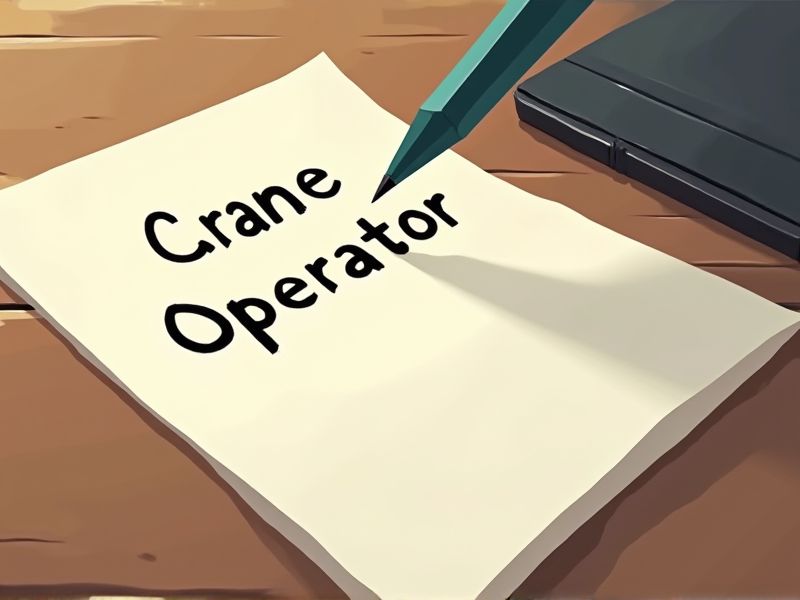
Crane operators handle complex machinery that requires precision and an acute understanding of safety protocols. Certifications ensure the operator has undergone rigorous training to minimize the risk of accidents on site. Regulations mandate that crane operators possess specific credentials to operate legally and safely. Explore these essential certifications for a Crane Operator.
NCCCO Mobile Crane Operator Certification
The NCCCO Mobile Crane Operator Certification is essential because it standardizes the qualification process, ensuring operators possess necessary skills and knowledge. This certification reduces workplace accidents and enhances safety by verifying an operator's ability to handle equipment responsibly. Employers often require this certification as it demonstrates compliance with industry regulations and improves professional credibility. Certified operators also tend to have improved job prospects and potentially higher pay due to their validated expertise.
NCCCO Fixed Crane Operator Certification
Holding an NCCCO Fixed Crane Operator Certification enhances workplace safety by ensuring operators meet rigorous standards. Certified operators experience fewer accidents, reducing liability and insurance costs for employers. The certification signals a commitment to professionalism, which is attractive to potential employers in the construction industry. Regulatory bodies and many companies require certification to comply with legal and safety regulations.
OSHA Crane Safety Training Certification
OSHA Crane Safety Training Certification is necessary to ensure crane operators are knowledgeable about safety protocols, reducing the risk of workplace accidents. Proper certification enhances awareness of operational hazards, leading to more secure handling of equipment. Employers benefit by adhering to legal compliance standards, minimizing liability and potential financial penalties. The certification supports a culture of safety, promoting well-being for both operators and surrounding personnel.
OSHA 10-Hour Construction Safety Certification
OSHA 10-Hour Construction Safety Certification equips crane operators with critical safety knowledge to minimize on-site accidents and injuries. The course provides insights into hazard recognition, enabling operators to identify potential risks before they lead to dangerous situations. Compliance with OSHA requirements can reduce legal liabilities for employers and promote a culture of safety. Certified operators contribute to increased productivity by preventing costly accidents and improving overall site safety standards.
OSHA 30-Hour Construction Safety Certification
Crane operators handle complex machinery, and the OSHA 30-Hour Construction Safety Certification provides essential safety training, reducing the risk of workplace accidents. It ensures operators understand comprehensive safety regulations, which is critical for operating cranes in diverse construction environments. The certification helps in fostering a culture of safety, minimizing potential hazards related to crane operations. Employers also prefer certified operators, as it indicates a commitment to maintaining high safety standards on site.
Rigging and Signal Person Certification
Rigging and Signal Person Certification is needed for crane operators because it ensures accurate communication during lifting tasks, minimizing the risk of accidents. Proper certification confirms that personnel have the skills to handle complex loads safely, enhancing job site safety. With certification, operators have a well-rounded understanding of the mechanical aspects and signals involved in crane operation, preventing equipment failure. Industry regulations often mandate these certifications to uphold safety standards and reduce liability on construction sites.
NCCER Crane Operator Certification
The NCCER Crane Operator Certification ensures standardized training, contributing to safer operations on construction sites. Employers may require certified operators, enhancing job opportunities and employment prospects. Certified operators demonstrate proficiency and adherence to industry regulations, reducing accident risks and liability issues. Certification fosters a competitive advantage, reflecting a commitment to professional development in crane operation.
Crane Load Calculation Certification
Crane load calculation certification ensures that crane operators have the necessary knowledge to assess and manage the weight limits of loads accurately. This certification minimizes the risk of equipment failure and workplace accidents by ensuring loads are within the crane's lifting capacity. Proper calculation prevents structural damage to the crane, leading to reduced maintenance costs and prolonged equipment lifespan. Employers gain confidence in operators' capabilities, enhancing overall safety and operational efficiency on job sites.
Rigging Supervisor Certification
Rigging Supervisor Certification ensures crane operators understand load dynamics, which reduces the risk of accidents due to improper rigging. Certification provides operators with the skills to assess and mitigate risks associated with lifting operations, promoting a safer work environment. A certified supervisor can better plan complex lifts, ensuring compliance with industry regulations and standards. Certification also boosts operator confidence, which can lead to more efficient and effective job performance.
First Aid/CPR Certification
Crane operators work in environments where they might encounter emergencies such as injuries from equipment mishaps, requiring immediate medical attention. A first aid/CPR certification enables crane operators to provide essential care in these situations, which can significantly reduce the severity of injuries. Emergency sites often experience delayed professional medical response due to their challenging locations. Thus, having a crane operator with first aid/CPR skills can potentially save lives and maintain safety compliance standards.
Summary
By obtaining certifications, you can enhance your skills and knowledge as a crane operator. This often leads to higher job opportunities and potentially increased salary prospects. Employers tend to prioritize certified operators due to demonstrated competence and safety assurance. Certification can also improve operational efficiency and reduce the likelihood of accidents, benefiting workplace safety.
